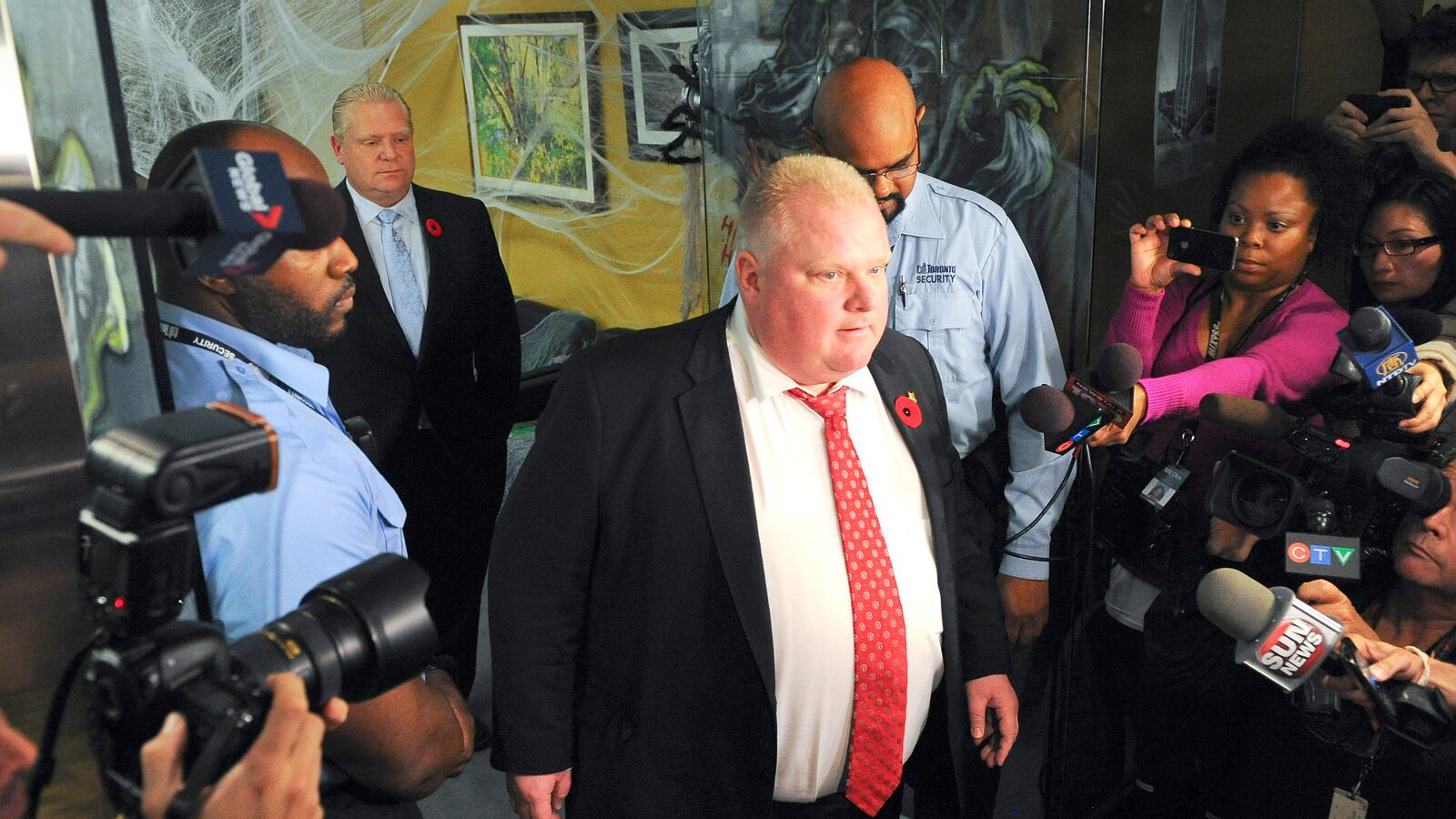TORONTO—It’s real. Toronto’s great civic MacGuffin is now in the hands of the police.

It had been rumored on and off for months that police were in possession of a video of Mayor Rob Ford appearing to smoke crack cocaine. But no one expected the police chief to call a press conference announcing its acquisition. Now, as Ford again refuses to resign, Toronto’s political circus has gained yet another ring.
And it’s kind of awesome. There’s a rush from living through a moment that is both self-evidently historic and brain-meltingly funny. Anything could happen! we’ve got drugs, politics, gangs, violence, addiction, and spycraft. And the story’s momentum constantly threatens to tip it beyond all of those things.
Rob Ford has a history of scandals too long to summarize in any one place. Even Wikipedia gave up attempting to be comprehensive and just hits the highlights.
They range from using city resources to further the interests of the high school football team he coached (Ford denied any wrongdoing); showing up at functions in impaired states (he denied that, too); and disappearing during the day, his whereabouts unknown (denied). His actual political policies—conservative populism—anger plenty of folks, too, but that’s a different story.)
In March, the Toronto Star published a comprehensive report of his alleged alcoholism and apparent refusals of his staff’s pleas to seek treatment. Following this, they were approached by a man who sought to broker the sale of a video that allegedly shows Ford smoking crack cocaine.
Weeks later, Star reporters Robyn Doolittle and Kevin Donovan convinced the video sellers to play it for them three times while they sat together in a car parked in the lot of a community housing complex in the city’s northwest corner. The Star held off on publishing their reporters’ accounts in the hope it could still obtain the video without handing over money to a professed drug dealer.
The video’s existence (or even its alleged existence) remained secret until Gawker editor-in-chief John Cook received a similar offer and flew up to Toronto to be shown the same video by the same person. He published his account two days later, on the night of May 16.
I saw the Gawker post moments before I arrived at a friend’s book launch; when I got inside the event, I headed straight to Doolittle and showed her the headline on my phone. I had never seen anyone bolt out of a room faster.
A couple hours later, Donovan and Doolittle’s story went up on the Star’s website. The added details included that Ford could allegedly be heard referring to a prominent Canadian politician as a “fag” and the students he coached as “fucking minorities.”
It was more than a week before the mayor addressed the report, preferring instead to literally run from the press at every opportunity. Eventually, he stated that he could not comment on a video that he hadn’t seen “or does not exist.” He later denied its existence in more certain terms when a woman pretending to be a fan of his made it past the call screeners on his weekly radio show in order to ask him about it on air.
Ford successfully convinced nearly half of Toronto residents that the whole thing was a Star-perpetrated hoax to destroy him. As I’ve previously written, one of the mayor’s greatest advantages is that he lives his life so outlandishly that the truth can seem implausible.
So much of Toronto’s character comes from the competition between two notions: 1) that we must strive to be a world-class city, and 2) that pursuing “world-class” status is a meaningless, suspect proposition and a preoccupation of the terminally insecure. We want to be noticed, and to be considered on the same plane as any of the world’s great cities (particularly New York), but we hate ourselves for wanting it.
As such, there’s a kind of elation associated with the Rob Ford saga: it is as epically weird as municipal politics ever get, and therefore feels of consequence. We have something that competes with the best.
It often seems as though half of Toronto has heard vague snatches of what else is out there and is waiting for the larger narrative to catch up to their particular nook of it. There is a glee in watching the spectacular downfall of a man whose ability to act without consequence stretches back more than a decade and often suggests a kind of supernatural immunity. There is a sense that something needs correction: that this man has too often thwarted conventional relationships between merit and reward and that that cannot be allowed to stand any longer. You do not get to continue as mayor of one of the continent’s largest cities after having been seen by reporters and police allegedly smoking crack cocaine. You just don’t. No.
At the same time, there are those who ricochet between denial and rationalization. (About 30 percent of Toronto residents, according to the polls.) Many love and identify with the mayor more strongly than you have ever felt about any politician. And some simply hate his enemies more than they distrust him.
He is a character grander than most in fiction, in a predicament that, depending on the day, is either reminiscent of a Coen brothers or Darren Aronofsky movie. It’s immense, cruel, beautiful entertainment. And we really do love it.






